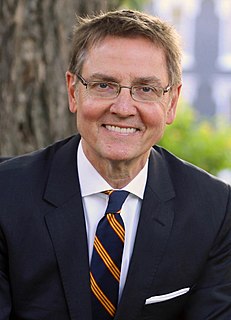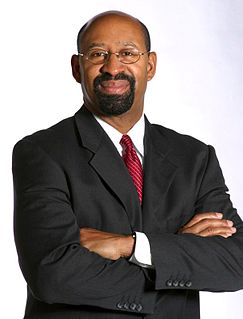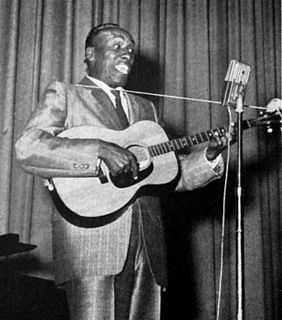Top 1200 Fourth Amendment Quotes & Sayings
Explore popular Fourth Amendment quotes.
Last updated on November 24, 2024.
The left looks at the Constitution and sees things that aren't there and then they find 'em. They look at things that are there and claim they're not there. Like the Second Amendment, nah, nah, it's not there, they really didn't intend that. No, no. Abortion. You can't find it, yeah, there it is, plain as day, see, it's right there in the 14th Amendment, the Tenth Amendment, the Ninth Amendment, the Fifth - no, it's not.
There is no question that under the Equal Rights Amendment there will be debates at times, indecision at times, litigation at times. Has anyone proposed that we rescind the First Amendment on free speech because there is too much litigation over it? Has anyone suggested the same for the Fourteenth Amendment I don't suppose there has ever been a constitutional amendment with so much litigation?
When they took the Fourth Amendment, I was silent because I don't deal drugs. When they took the Sixth Amendment, I kept quiet because I know I'm innocent. When they took the Second Amendment, I said nothing because I don't own a gun. Now they've come for the First Amendment, and I can't say anything at all.
...The Bill of Rights is a literal and absolute document. The First Amendment doesn't say you have a right to speak out unless the government has a 'compelling interest' in censoring the Internet. The Second Amendment doesn't say you have the right to keep and bear arms until some madman plants a bomb. The Fourth Amendment doesn't say you have the right to be secure from search and seizure unless some FBI agent thinks you fit the profile of a terrorist. The government has no right to interfere with any of these freedoms under any circumstances.
The DOJ has employed these investigations in communities across our nation to reform serious patterns and practices of force, biased policing and other unconstitutional practices by law enforcement. I'm asking the Department of Justice to investigate if our police department has engaged in a pattern or practice of stops, searches or arrests that violate the Fourth Amendment.
For the Fourth Amendment protects people, not places. What a person knowingly exposes to the public, even in his own home or office, is not a subject of Fourth Amendment protection. But what he seeks to preserve as private, even in an area accessible to the public, may be constitutionally protected.
This [anti-terrorism bill] is a violation of the First Amendment right to free speech and the Fourth Amendment protection of private property... Some of these provisions place more power in the hands of law enforcement than our Founding Fathers could have dreamt and severely compromises the civil liberties of law-abiding Americans. This bill, while crafted with good intentions, is rife with constitutional infringements I could not support.
One of the things that I'm doing and I'm - we have the Johnson Amendment. You know what that is. That Lyndon Johnson in the 1950s passed an amendment because supposedly he was having a hard time with a church in Houston, with a pastor. And he passed an amendment saying basically if you're a pastor, if you're a religious person, you cannot get up and talk politics.
The institutions that we've built up over the years to protect our individual privacy rights from the government don't apply to the private sector. The Fourth Amendment doesn't apply to corporations. The Freedom of Information Act doesn't apply to Silicon Valley. And you can't impeach Google if it breaks its 'Don't be evil' campaign pledge.
In 1979, the Supreme Court ruled 5-3 in Smith v. Maryland that a few days' worth of phone records for a single individual were not protected by the Fourth Amendment. The NSA today, though, collects hundreds of millions of phone records from hundreds of millions of Americans without an individualized warrant.
Disturbingly, the First Amendment, along with the Fourth Amendment - protecting against unreasonable searches and seizures, and requiring warrants - have been the major casualties of the shift in government policy in the last two decades. Unfortunately, I think that the biggest consequences of this tragedy won't be clear until it is far, far too late.
I want to collect more records from terrorists, but less records from innocent Americans. The Fourth Amendment was what we fought the Revolution over! John Adams said it was the spark that led to our war for independence, and I'm proud of standing for the Bill of Rights, and I will continue to stand for the Bill of Rights.
Is there any media here? A couple? Excellent. I want to ask you, I don't know what persuasion you are, but would you like to go outside to a 1st Amendment zone? No! So did it make sense to have a 1st Amendment zone in Nevada? No, of course not. That's ridiculous. If we're talking about one of the most egregious things that happened down there, it was the 1st Amendment zone in Nevada.
When you suveil a person abroad, you don't have to have a warrant to do so. That has never been so they don't have the fourth amendment protection. On occasion, that person might call somebody in the United States, and if they're a terrorist, you really want to know who they are talking to. Maybe they're plotting an attack on the United States.
I'd say that [Louis] Brandeis practiced a kind of a "living originalism," to use the title of Jack Balkin's great book. He said you start with the paradigm case, which in the case of the Fourth Amendment was these general warrants or writs of assistance, but you define it at a level of abstraction that you can take it into our age and make it our own.
The First Amendment of the US Constitution ... is an eloquent repudiation of the First Commandment's prohibition of religious freedom. It is also a repudiation of the Third Commandment's prohibition of freedom of speech. The Thirteenth Amendment repudiates the institution of slavery which is so cozily assumed by the Fourth and Tenth Protestant Commandments.
When a young non-white male is stopped and searched at the whim of a police officer, his idea of personal space, privacy and self esteem are shattered, to say nothing of his Fourth and Fourteenth Amendment protections. The damage goes deep quickly and stays. Stop & frisk, as well as a tactic, is also an incitement.














































